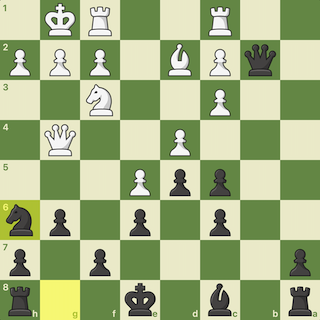I posted a popular question a couple of days ago, and it brought up another topic that is worthy of a question.
For reference, I've been playing 6–7 weeks, and my chess.com rating is a laughable ~300. I am the whipping boy of the chess club, am nowhere near winning a game against even the other beginners, and actually don't get any advice on how to fix my current blundering and hanging piece issues (general board vision). After some thought about it, they're patient, but not helpful, despite all having 30–50 years experience.
For instance, I asked the 2,100 player for direct advice after being an opponent in a simul. I was only told, "You're improving" – this despite getting forked by a pawn in the first few moves, and missing a knight fork that caused me to resign. These mistakes sink me immediately.
I try to dedicate two or three hours a day. You can see from the linked question the type of effort I put in. However, you can see from this move (14. ...Nh6??) in a current daily game that my efforts are fruitless at the minute as I completely missed the obvious and clear 15. Bxh6:
In short, my confidence is incredibly low, and I'm being discouraged from putting in the work if I can't improve. I'm desperate to win games of chess because I'm working hard to try and improve, and don't want to give up. However, I want to be competitive and equal to the rest now, while feeling like the work I'm doing is paying off. I'll reiterate – I'm desperate to do much better than I am and want to be a winning chess player.
My question:
- How can I keep my confidence intact after constant losing and repetition of the same silly and basic mistakes I'm always making?
Losing feels awful, isn't fun, and doesn't come with any feedback (although what feedback I can get other than a magic bullet I don't know). I'm trying my hardest and best to improve.
My fanciful long-term goal is to be a 2,000 rated player someday. A mid-term goal is to be 1,600–1,800 to get on the league team. A short-term goal is to get to 1,300 fast to at least be able to beat the lowest rated player. The reality is that I'm 40 years old, 300 rated on chess.com, and not learning from my blunders and stupid mistakes. Indeed, giving up seems like the worthwhile improvement!

